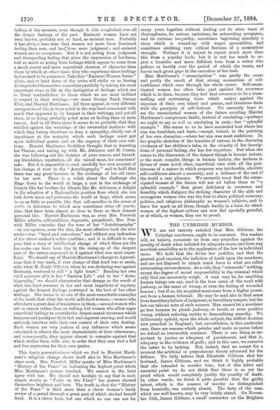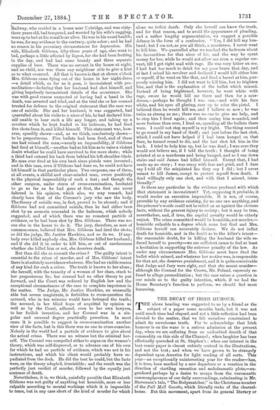THE UXBRIDGE MURDER.
WE are not entirely satisfied that Mrs. Gibbons, the Uxbridge murderess, ought to be executed. Our readers will, we believe, exonerate us from any prejudice against the penalty of death when inflicted for adequate cause, and from any mawkish sensibility as to the application of the law in individual cases. We hold that the divine law justifies, and that the general good requires, the infliction of death upon the murderer, and are not disposed to attach much force to what are called extenuating circumstances. As a rule, they " extenuate " nothing, except the degree of moral responsibility in the criminal which only God can accurately weigh. A man may be, for anything human beings can say, mad in the true sense of the word with jealousy, or the sense of wrong, or even the feeling of wounded honour ; but if so, his acquittal must come from a higher power, not from a human tribunal. He may be. mad also in that sense from hereditary failure of j udgment, or hereditary temper; but the law can take no note of such excuses. Man cannot let a murderer go free because he pleads jealousy, or insult, or even positive wrong, without reducing society to demoralising anarchy. We deliberately uphold, upon the whole subject, the stiffest doctrine now preached in England; but, nevertheless, in this particular case, there are reasons which perplex and make us pause before we defend an irreversible sentence. There is one thing as im- portant to justice as adequacy of punishment, and that is, adequacy in the evidence of guilt ; and in this case, we conceive the latter to be lacking. Not indeed, that we accept for a moment the artificial or preposterous theory advanced for the defence. We fully believe that Elizabeth Gibbons shot her husband, James Gibbons, and we think it highly probable that she intended to murder him ; but of this latter and essential point we do not think that there is as yet the proof which would completely justify the penalty of death. In other words, we think it quite possible that the guilty intent, which is the essence of murder as distinguished from homicide, was entirely absent. The facts of the case, which are well known, may be very briefly stated. On Novem- ber 15th, James Gibbons, a small contractor on the Brighton
Railway, who resided in a house near Uxbridge, and was sixty- three years old, bad tempered, and worried by his wife's nagging, went up to bed at his usual hour alive. He was in his usual health; he was, for any evidence to the contrary, quite sober ; and he had no reason in his pecuniary circumstances for depression. His wife, Elizabeth Gibbons, fifty-three years of age, also went to bed, perhaps a little affected by liquor, for she had been fretting in the day, and had had some brandy and three separate supplies of beer. There was no servant in the house at night, and no child, nor was there any neighbour able to give a hint as to what occurred. All that is known is that at eleven o'clock Mrs. Gibbons came flying out of the house in her night-dress —a detail which, so far as it goes, is inconsistent with pre- meditation—declaring that her husband had shot himself, and giving hopelessly inconsistent details of the occurrence. She was with good reason suspected of having had a hand in the death, was arrested and tried, and at the trial she or her counsel trusted for defence to the original statement that the case was one of suicide. She and her husband, it was suggested, had quarrelled about his visits to a niece of his, he had declared him- self unable to bear such a life any longer, and taking up a revolver which he kept loaded in his bedroom, he had fired five shots from it, and killed himself. This statement was, how- ever, speedily shown—and, as we think, conclusively shown— to be preposterous. Five bullets had been fired, and of these one had missed the man,—nearly an impossibility, if Gibbons had fired at himself,—another had so hit him as to raise a violent doubt whether he could have survived to fire more shots ; while a third had entered his back from behind his left shoulder-blade. No man ever fired at his own back since pistols were invented ; and in this case, even if Gibbons had done so, he could not have hit himself in that particular place. Two surgeons, one of them, at all events, a skilful and clear-minded man, swore positively to the physical impossibility of such a feat ; and though the other surgeon, under stress of cross-examination, hesitated to go as far as he had gone at first, the first one never faltered in his opinion, which also, we may remark, had clearly been that of the Coroner's jury who saw the body. The theory of suicide was, in fact, proved to be absurd ; and if Gibbons had not committed suicide, then he had either been shot by an assassin concealed in the bedroom, which nobody suggested, and of which there was no remotest particle of evidence, or he had been shot by Mrs. Gibbons. There was no- one else in the house to do it. The jury, therefore, as men of common-sense, believed that Mrs. Gibbons had fired the shots; so did the judge, Mr. Justice Hawkins, and so do we. If any- body ever killed anybody else, Mrs. Gibbons killed her husband ; and if she did it in order to kill him, or out of carelessness whether she killed him or not, she deserves death.
But then did she so commit the crime ? The guilty intent is essential to the crime of murder, and of Mrs. Gibbons' intent there is absolutely no evidence whatever. She had no visible reason of any kind for such a crime. The truth is known to her alone ; she herself, with the tenacity of a woman of her class, stuck to her preposterous lie; her counsel had no other theory to put forward, and the Court was reduced by English law and the exceptional circumstances of the case to complete impotence in the matter. The Judge, Mr. Justice Hawkins, an unusually able but severe magistrate, is forbidden to cross-question the accused, who in ten minutes would have betrayed the truth ; the accused, in her blind hope of acquittal by opinion as well as by the Court, adhered, even to her own lawyers, to her foolish invention, and her Counsel was in a sin- gular and unusual degree practically powerless. In most cases it is possible to suggest in cross-examination another view of the facts, but in this there was no one to cross-examine.
Nobody in the world had a particle of evidence to give about the actual crime. There was no witness but the criminal her- self. The Counsel was compelled either to argue on the woman's theory, which was self-disproved, or to advance one of his own for which he had no particle of evidence, which was not in his instructions, and which his client would probably have re- pudiated from the dock. He did the best he could, but the facts were, on the theory adopted, irresistible ; and the result was the perfectly just verdict of murder, followed by the equally just sentence of death.
Nevertheless, it is, we think, painfully possible that Elizabeth Gibbons was not guilty of anything but homicide, more or less culpable according to mental workings which it is impossible to trace, but in any case short of the kind of murder for which alone we inflict death. Only she herself can know the truth, and for that reason, and to avoid the appearance of pleading, and a rather lengthy argumentation, we suggest a possible defence in the form of a confession. "Yes, I did kill my hus- band ; but I am not, as you all think, a murderess. I never went to kill him. We quarrelled after we reached the bedroom about his favouritism for that niece of his, and the way he spent money for her, while he would not allow me even a regular ser- vant, till I got right mad with rage. He was very bitter on me. I had had too much to drink for my poor brain that day, and at last I seized his revolver and declared I would kill either him or myself, if he went on like that, and fired a barrel at him, pur- posely missing him. I did not want to kill him, but to frighten him, and that is the explanation of the bullet which missed. Instead of being frightened, however, he went white with rage, swore he would kill me there and then for a mur- deress,—perhaps be thought I was one,—and with his face white, and his eyes all glaring, rose up to seize the pistol. I believed' then he would kill me, and I believe so now ; he was twice as strong as me ; there was no one to give me help, and to stop him I fired again ; and then seeing him wounded, and more furious than ever, I fired on, spending all the bullets there were. I could not stop myself in my fright. The thing seemed to go round in my hand of itself ; and just before the last shot, which I could not have helped if I had been hanged on that floor, he turned round to die, and the last shot hit him in the back. I tried to help him up, but he was dead ; I was sure they would not believe me, if I told the truth ; I thought of being pointed at as a murderess and being hanged, and so I ran dower stairs and said James had killed himself. Except that, I had made up no story ; I was crazy with fear and grief, and I dare say I told all the misjointed lies they say I did ; but I never meant to kill James, except to protect myself from death. I fired willingly only one shot, and with that I missed, inten- tionally."
Is there any particular in the evidence produced with which that statement is inconsistent? Yet, supposing it probable, it would render an execution impossible. It is not, of course, provable by any evidence existing, for no one saw anything, and the prisoner's words could not be relied on as against the obvious facts, without the gravest injury to society ; but it may be tree, nevertheless, and, if true, the capital penalty would be utterly unjust. The crime committed would be homicide, not murder,— homicide culpable to a degree which none but God and Mrs. Gibbons herself can accurately declare. We do not inflict death for homicide, and in the doubt as to the killer's intent— the reasonable doubt, for in killing the husband the wife re- duced herself to poverty—we see sufficient cause to feel at least a hesitation in supporting the extreme penalty of the law. As under any circumstances Mrs. Gibbons must have fired the bullet which missed, and whatever her motive was, is responsible for that act, she deserves punishment, and it is quite conceivable that Judge and Jury were right, and that she meant murder— although the Counsel for the Crown, Mr. Poland, expressly re- fused to allege premeditation ; but the case raises a question in our minds as to the guilty intention, which, if we had the Home Secretary's function to perform, we should feel most harassing.



































 Previous page
Previous page